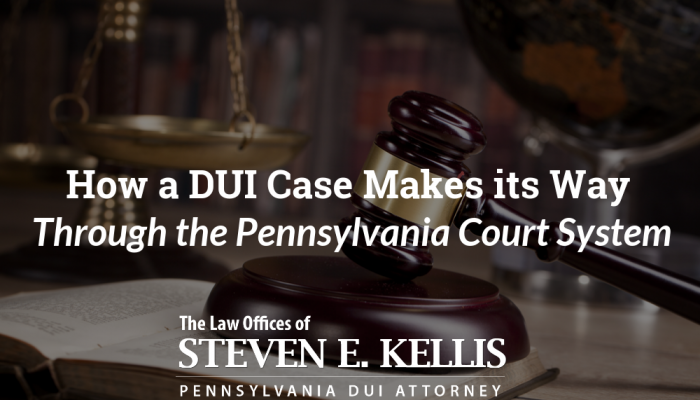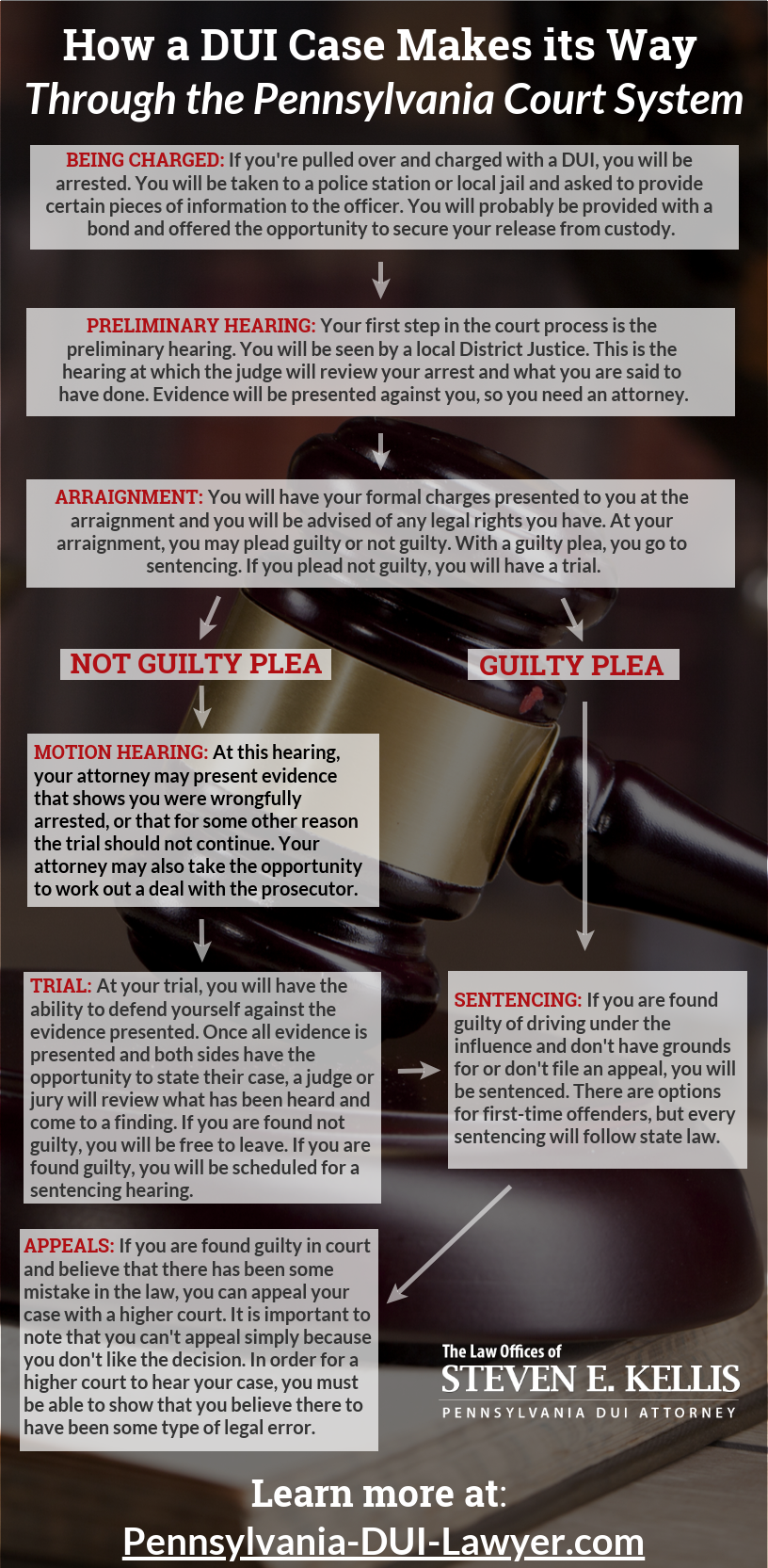It is stressful when you are forced to deal with the unknown. Being charged with DUI for the first time means that you will be facing several unknowns. You not only have to deal with the anxiety of being charged with a crime, but the upcoming court process. While a DUI is certainly a serious charge, it may help to ease your fears by knowing what you are about to go through.
The court process for anyone charged with a DUI in Pennsylvania follows a typical set of steps. Your path may differ from the norm, of course, but there are certain things you can reasonably expect to happen.
1. Charges
The very first thing to happen is the traffic stop. You may have already gone through this or know someone who has. A police officer pulls you over, you are asked to submit to a set of tests and placed under arrest. You will be taken to a police station or local jail and asked to provide certain pieces of information to the officer.
You will be provided the opportunity to be released from custody in most cases. You will be taken to a person called a bail commissioner to discover how much it will take to get you home.
If you post your bail, or someone posts it for you, you are bound by law to show up for any future court appearances and follow the lawful orders handed down by a judge. Should you fail to appear, a judge will issue a bench warrant for your arrest, you will be taken into custody and your bail will be forfeited.
2. Preliminary Hearing
Your first step in the court process is the preliminary hearing. You will be seen by a local District Justice. This is the hearing at which the judge will review your arrest and what you are said to have done. You need an attorney at this hearing with you because it is the first chance you will have to hear the evidence that will be used against you.
3. Arraignment
You will be scheduled for an arraignment after your preliminary hearing. The arraignment will be held about a month or two after your preliminary hearing. You will have your formal charges presented to you at the arraignment and you will be advised of any legal rights you have. If your DUI attorney makes the decision to waive the arraignment, you won’t have to appear. Make sure to discuss this with your attorney before assuming that you can skip this meeting.
At your arraignment, you may plead guilty or not guilty. With a guilty plea, you go to sentencing. If you plead not guilty, you will have a trial.
4. Motion Hearing and Trial
You will be given a trial date. Before this date, you may also have a motion hearing. At this hearing, your attorney may present evidence that shows you were wrongfully arrested, or that for some other reason the trial should not continue. Your attorney may also take the opportunity to work out a deal with the prosecutor. This is encouraged, as it leads to a lighter case load for the courts. If the case is not settled one way or another, it moves to trial.
At your trial, you will have the ability to defend yourself against the evidence presented. By this time, you and your attorney should have had several discussions about your strategy.
Once all evidence is presented and both sides have the opportunity to state their case, a judge or jury will review what has been heard and come to a finding. If you are found not guilty, you will be free to leave. If you are found guilty, you will be scheduled for a sentencing hearing.
You can reasonably expect this process to take about six months from arrest to the conclusion of your trial. Factors could come into play that would shorten or extend this time. Your lawyer should keep you up to date regarding the specific process you will be going through.
First Time Offender Option: ARD
A person charged with DUI for the first time may be eligible for the Accelerated Rehabilitative Disposition (ARD). This option is only available for people who have no criminal, or a very limited criminal, record and have been charged with a minor, non-violent offense.
The purpose of the program is intended to encourage offenders to participate in a rehabilitative program. Once the program is complete, there is the possibility of returning to a clean record. Here’s how it works.
If you have been charged with some type of minor offense, including many types of DUIs, you can apply for the program. If you are accepted, your case is put on hold for approximately one year. The court will lay down certain requirements that must be met while your case is on hold. Once you have completed what was required, the court will advise you that your case is eligible for early dismissal. Once your case has been dismissed, it will be invisible from any public records check.
Requirements of ARD
Every case is unique and the requirements set forth in your case may be different, but typically you will have to:
- Complete community service
- Complete a safe driving course
- Complete alcohol counseling
- Have your driver’s license suspended
- Have no alcohol use
- Have no drug use
- Pay the cost of the program
- Waive your right to a speedy trial
- Not be charged with any crime during the program
Talk to a Pennsylvania DUI Attorney Today
If you have been charged with DUI in Pennsylvania, reach out to our office for assistance. We will provide you with a free case evaluation to determine the best options for your specific set of circumstances.Call today to schedule your appointment.

